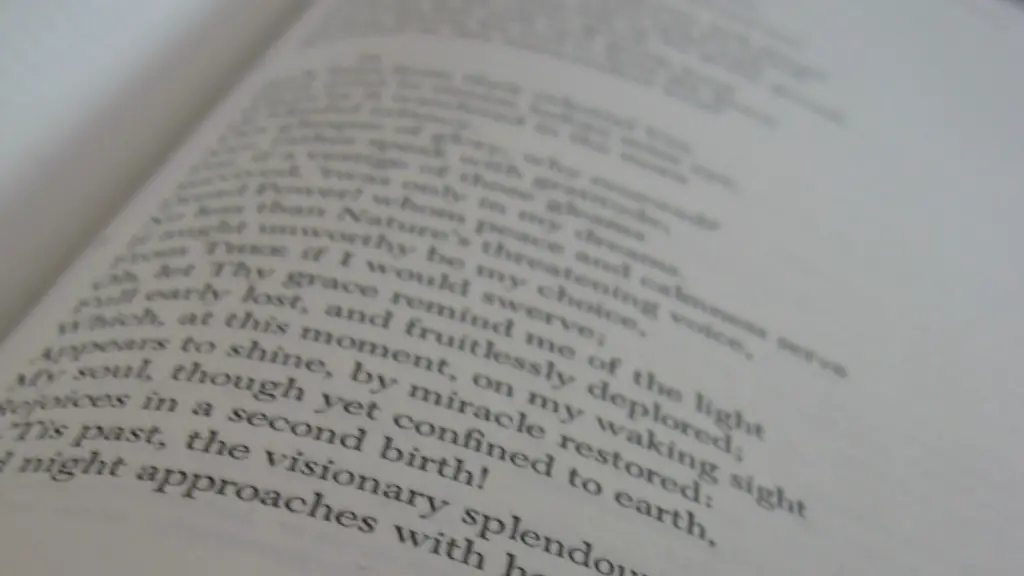Langston Hughes is known for being one of the most influential African American writers of the twentieth century. Born in 1902, he went on to write poems, short stories, plays, and essays that captured the emotions, struggles and experiences of African Americans. He also studied a variety of subjects in college and completed a wide range of courses. So, what did Langston Hughes study?
Hughes attended both Columbia University against his parents’ wishes and Lincoln University in Pennsylvania. Though he dropped out of Columbia, he studied a variety of subjects while he was there. These included English, classical philology, science and mathematics. After enrolling at Lincoln University, Hughes majored in English, wrote for the school newspaper and was a member of the poetry society.
In addition to his studies, Hughes was also a prolific reader, and read both classic and contemporary works. He was especially drawn to books about African American life and culture, with works such as Jean Toomer’s Cane, Zora Neale Hurston’s Their Eyes Were Watching God and W.E.B. Dubois’ The Souls of Black Folk, which he often quoted in his writings, being amongst his favorites.
When it came to his own writing, Langston Hughes drew from diverse sources to convey powerful messages about the African American experience. Although the content of his writing is often seen as racially charged, Hughes himself rejected the notion of a ‘Negro’ literature and instead embraced the idea of a universal African American ‘folk-song’, in which all Americans could participate.
Hughes was also very much a lover of the spoken-word and believed strongly in the power of poetry to capture feelings and emotions that can’t always be expressed in written form. As such, he often wrote poems in the jazz style and performed them around Harlem, drawing upon the blues and jazz he had heard so often in his travels.
What is clear is that Hughes’ education, both formally and informally, had a huge influence on his work. His studies in English, his knowledge of American culture and his love for the blues and jazz all helped to shape his writing and enabled him to create an insightful and captivating body of work.
Homes
In addition to Langston Hughes’ studies, the homes he lived in were also a major influence on his writing. Growing up between three homes in Kansas and the Midwest, Hughes learned firsthand about the complexities of American life. He spoke openly about growing up during ‘The Great Migration’, when thousands of African Americans moved out of the South to seek better economic opportunities, as well as facing racism in both the North and the South.
Hughes was witness to the injustices of segregation and lynching, as well as the economic struggles that came with poverty, and it is these experiences that shaped his writing. He spoke openly and honestly about these issues, often using vivid imagery to bring both darkness and light to his topics.
It was also during his visits to the segregated neighbourhoods of Harlem that Hughes heard and formed close relationships with popular blues musicians. Jazz was an especially prominent influence in his writing, and he used the style to talk about issues such as poverty and racism, as well as about love and hope.
Hughes’ experiences in his childhood homes and trips to the jazz mecca of Harlem had a deep and lasting impact on his writing. The poetry, stories and plays he created during this time are integral to his body of work and provide a valuable insight into the realities of African American life in the early to mid-twentieth century.
Travels
After his formal education, Langston Hughes traveled across Europe, Africa and the United States. His travels influenced both his writing style and subjects and helped him to capture the African American experience in different parts of the world.
During his travels to the West Indies, Hughes was introduced to the work of Marcus Garvey, the Jamaican political writer who called for a ‘Back to Africa’ movement. His experiences here sparked a renewed appreciation for African American culture and identity, which can be seen in his writings, notably in his essays and stories, such as ‘The Negro Artist and the Racial Mountain’ and ‘Dream Variations’, respectively.
Hughes was also an avid reader, and his travels brought him into contact with hundreds of writers who, along with his own experiences, helped to shape his work. He often relied on folk tales, quotes from famous philosophers and accounts of conversations for source material, expressing his own unique viewpoint through language, metaphor and symbolism.
It is clear that Langston Hughes’ travels were a major source of inspiration and helped to give his writing a greater scope and a greater reach. His accounts of life in Harlem, France and Madrid, the West Indies and South America, along with his observations of African American culture, inspired generations of writers who, like him, wanted to portray the struggles and successes of their people.
Influences
As well as his studies and travels, Langston Hughes was also influenced by a range of other sources. These included the writings of Walt Whitman, Emily Dickinson and W.E.B. Dubois, with Hughes often citing the latter in his essays and poems. He also had an appreciation for visual art and regularly attended galleries, drawing inspiration from the works of Romare Bearden, Charles Alston and Jacob Lawrence.
Hughes was passionate about music and attended musicals, such as Show Boat, whenever he could. He was particularly inspired by the blues, jazz and ‘hot jazz’ performed in the clubs of Harlem, often using these styles to convey stories of African American life. He was also an avid collector of 78s, buying both new and used records, a practice which enabled him to bring the blues into his own home.
It is clear that Langston Hughes drew on various sources of inspiration to create a rich, suggestive and expansive body of work. From his studies and travels to his love for music and visual art, each of these elements played an important part in shaping his writing and helped to give his works a greater depth and texture.
Legacy
Langston Hughes’ body of work lives on long after his death. He produced some of the most iconic and influential literary works of the twentieth century, delighting and inspiring generations of readers in the process. His works have been translated into numerous languages, and his influence can be seen in the works of writers and artists today.
The legacies of Hughes’ work are multi-cultural and multi-generational and will continue to be felt by those looking to learn more about the experiences and struggles of African Americans. A poet, playwright, novelist and social activist, Hughes was a powerful voice for African Americans and a truly global figure.
Langston Hughes left a lasting legacy, not just as an African American writer, but as a thinker and an explorer. From his studies of English and classical philology, to his travels and the blues and jazz he heard, Hughes created a body of work that continues to bring joy, comfort and understanding to readers today.
Desire For Change
As well as providing a valuable source of insight into the African American experience, Langston Hughes’ work also expressed a burning desire for change. Hughes’ desire came not only from himself but also from those whose voices were often silenced and forgotten in the fight for civil rights.
This desire is expressed clearly in his works, particularly in his calls for unity and progress amongst African Americans and society as whole. He wanted to see a world in which everyone was free to live in dignity and peace and was strongly opposed to racism and bigotry.
This desire for change can also be seen in Hughes’ use of resistance language in his work. He was an advocate for justice and equality, and often used his writing to express his ideas and to inspire those around him to take a stand against injustice. Through his words, he encouraged people to speak up and to fight for a better future.
It is clear that Langston Hughes’ desire for change has left a lasting impression on his work and on those he has touched. His commitment to justice and equality has been an inspiration to many, and his words continue to bring hope and understanding to readers today.
Final Thoughts
Langston Hughes was an inspiring and influential African American writer. His studies of English, classical philology, science and mathematics gave him the knowledge and understanding to create insightful and captivating works. His travels around the world and his appreciation of art, music and literature also had an impact on his writing, giving it a greater scope and depth.
Above all, Hughes’ work expresses a desire for change. He was a passionate advocate for justice, equality and peace, and used his writing to speak up for those whose voices were often silenced and forgotten. His works continue to be an inspiration to those looking to make a difference.
Langston Hughes was an extraordinary and multifaceted writer, and while his studies were important in shaping his work, it was his experiences, desires and passions that ultimately made him the influential and powerful writer that he is remembered as today.





